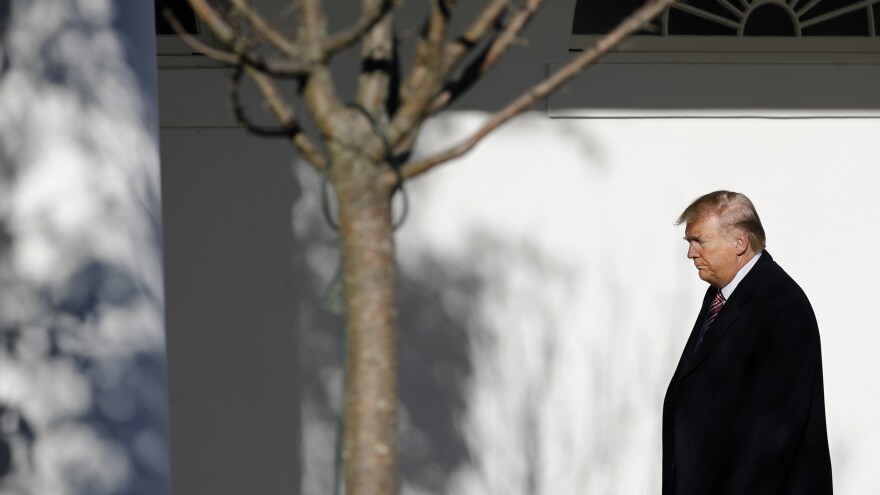In a ceremonial proceeding, Texas electors met at the state Capitol on Monday and delivered their state's 38 electoral votes to President Donald Trump. The vote came as electors across the country were gathering to cast ballots and are by the end of the day expected to award the 270 votes needed to formally win the election to former Vice President Joe Biden.
Biden won 306 pledged electoral votes in the November election, but Trump — along with many Texas Republicans — has refused to accept defeat and waged a legal and political campaign to get certain swing states to undo the results. Typically, the meeting of the Electoral College is a mostly ignored formality. But Republicans' continued disputes of the election have caused this year's vote to take on a rare public fascination in 2020.
Once the meeting got underway in Austin, it was a relatively short, drama-free process. It took nearly 30-minutes for electors to select a chair and secretary of their meeting, a largely ceremonial role.
Numerous lawsuits filed by the Trump legal team claiming or raising questions of fraud were thrown out of state and federal court. Even so, Texas Attorney General Ken Paxton launched a last-ditch legal effort to overturn the election results last week, only to be soundly rejected by the U.S. Supreme Court.
Many leading Texas Republicans were supportive of Paxton's effort. More than a dozen Texans in Congress signed an amicus brief endorsing Paxton's tactic. Ted Cruz, the state's junior U.S. senator, agreed at the president's request to argue the case before the high court if it were heard. The state's senior senator, John Cornyn, questioned Paxton's legal theory, however.
Meanwhile, state Republican Party chairman, Allen West, made national news after the Supreme Court's decision by suggesting that states opposed to the ruling "should bond together and form a Union ... that will abide by the constitution."
The next — and final step before inauguration — will be on Jan. 6, when the states send their votes to the U.S. Capitol, where they will be tallied in a joint session of the newly sworn in U.S. Senate and House.
In most circumstances, electors follow the will of the state's voters. But in 2016, two Texas electors refused to vote for Trump — one voted for then-Gov. John Kasich of Ohio and another cast a ballot for a fellow Texan, former U.S. Rep. Ron Paul. Their dissent triggered Gov. Greg Abbott to push for a bill that would “bind” Texas' Electoral College members to the result of the statewide popular vote. The measure failed.
In Texas, Trump decisively defeated Biden, but the margin — 5.6% — was the closest between the two parties since 1996.
Electors are often low-profile party fixtures within the state's political world, but this year's Republican lot includes state Rep. Briscoe Cain of Deer Park. There are 538 electors total.
Hours ahead of Monday’s meeting, even with Texas slated to deliver its votes to Trump, several Republicans suggested that the nation’s election results were not yet settled.
“The Electoral College is casting their votes,” tweeted U.S. Rep. Lance Gooden, R-Terrell. “Democrats will soon say it is time to move on. They are 100% WRONG. We should not move on until the massive claims of voter fraud are answered and addressed!”
U.S. Rep. Chip Roy, an Austin Republican, released a statement Monday afternoon saying "there's no question about the outcomes in Texas, despite the millions upon millions that Democrats desperately poured into races all over the place." But followed up with a call for for answers to "some legitimate questions" raised about "what went on in" races in other states."

